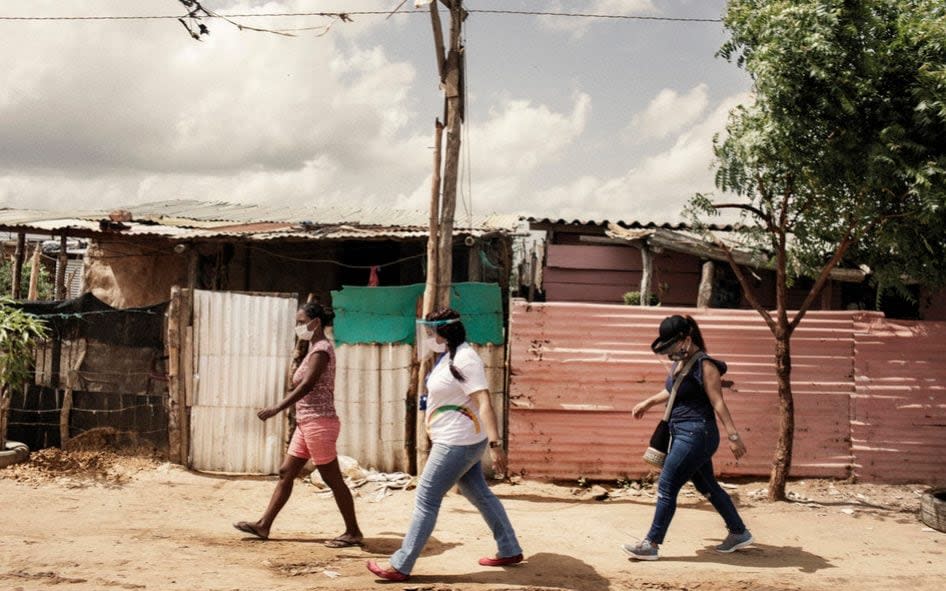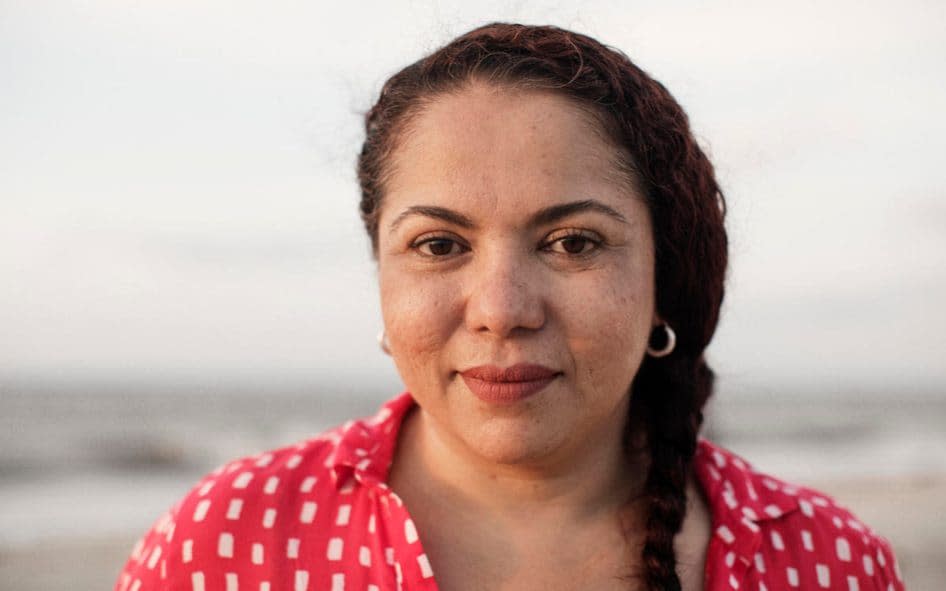Woman who provides a safe haven for child trafficking victims is honoured by the UN

Mayerlín Vergara Pérez has witnessed many distressing scenes in the course of her work. She recalls a young girl clawing at her skin and shouting over and over “I don’t want this body".
“There’s a lot of despair and hopelessness – a lot of girls have suicidal thoughts. One 11-year-old girl spent five months without speaking a word, just hitting the walls,” said Ms Perez, who runs a home for children who have been sexually abused and trafficked in Colombia.
Now, Ms Pérez, who has made rescuing girls and boys from sexual violence her life’s mission, is being honoured by the United Nations and will receive this year’s Nansen Refugee Award.
The honour is given to those who have given "outstanding service" in the cause of refugees. Previous winners include Eleanor Roosevelt, Senator Ted Kennedy, and Zannah Mustapha who founded a school that teaches Boko Haram children.

“Maye’s their north star,” said Tashana Ntuli, an associate protection officer for UNHCR, the refugee arm of the UN. “She defends those children and their rights, tooth and nail.”
There has been a spike in human trafficking and sexual exploitation of women and children in Colombia in recent years. Between 2015 to 2019, the number of trafficking victims increased by 23 per cent – 63 per cent of those identified were between the ages of 10 and 30.
The influx of refugees from neighbouring Venezuela – whose leader Nicolas Maduro was last week accused of probable crimes against humanity by UN investigators – is putting the country under increasing strain.
An estimated 1.7 million Venezuelans have fled to Colombia, escaping violence, poverty and a lack of food and medicine. Many children cross the border alone. Their journeys and precarious living situations leave them vulnerable to abuse.
The authorities cannot support all the refugees, and the job of protecting the most vulnerable has fallen on local activists.
Ms Pérez’s journey started 22 years ago when she drove past two very young children sniffing glue. “That had a huge impact on my life,” she said “I felt a deep pain in my heart and then and there I asked God to give me the opportunity to work with boys and girls.”
Ms Pérez, and the organisation she works for, the Renacer Foundation – which has helped over 22,000 child and adolescent survivors of sexual exploitation over 32 years – scour the streets of the fourth poorest region of the country, La Guajira, looking for children in danger.
“We’ve found places – parking lots, under bridges, in cemeteries – where 100-200 refugees will live. Little girls, aged eight or nine, will sleep next to men doing drugs or drinking alcohol,” Ms Pérez said.
“Forty people might live in a house built for eight. Families will sometimes live in a house with men, and in exchange for rent, the men will sexually abuse the young girls.” she added.
“That’s one of the most painful situations, where the mum, dad, or aunt is giving consent for these children to be abused.”

Since 2018 refugee children have been able to go to school, but because of the “bureaucratic system” this can be difficult, Ms Pérez told The Telegraph.
To make up for the lack of education the Renacer Foundation organises activities like playing games or holding sessions about sexual exploitation, to establish relationships with the children.
“The first interaction with children is important – it’s important for them to see there are adults who are willing to take care of them. The children themselves don’t look for help, they don’t trust adults or institutions. They sometimes don’t even recognise that there is a problem in their lives,” Ms Pérez said.
For some children it can take just an hour to join the foundation, for others it takes six months to establish the level of trust where they feel happy to move in.
When the children arrive, they follow a rigorous schedule including therapy, group sessions and educational activities. More than a dozen professionals work at the home, including teachers, a psychologist, social workers, a nutritionist and a lawyer to help guide them through the recovery process, which takes approximately 18 months.
Once able to, the children can resume their studies and will find a permanent home either through adoption or by being reunited with family members.

Ms Pérez, who worked as teacher and campaigner before setting up the home in 2019, said 17 of the 75 children in the home over the past year have been victims of human trafficking.
“That figure is alarming because human trafficking is hidden – you can assume the problem is much bigger. We have found some terrifying cases of children aged 10 brought from Venezuela to Colombia to be shut in a house where traffickers abuse them.”
In 2009, the foundation helped to usher into law two landmark pieces of legislation. One established a mandatory minimum sentence of at least 14 years in prison for those convicted of aiding and abetting the sexual exploitation of children and adolescents. The other targeted the owners of establishments that allow the sexual exploitation of children on their premises.
“Fleeing their houses, families, friends, and then being sexually abused too – it’s too much for those small bodies,” Ms Perez said. “We really need to listen to these children; they need us, and need to know there are other adults that are taking care of them.”
The outbreak of Covid-19 has increased the vulnerability of the children, too. Tight border restrictions aimed at curbing the spread of the virus has made crossing at official border points near-impossible, meaning the most desperate people are opting for methods which increases their risk of sex trafficking. Disruptions to education and separation from caregivers who fall sick often leave children unattended.
The drive to keep people indoors has meant children have been trapped with their abusers inside, making them hard to reach.
“Because the children are spending more time on the internet, human trafficking networks are using it to reach out to children, asking them to send naked pictures. We have seen cases where abusers are trying to reach children through video games,” she added.
Ms Pérez, who has spent over 20 years of her life helping victims, acknowledged that the work is emotionally, physically and spiritually draining. “But when you see a girl arrive full of hatred and pain and anger, and you see her transforming into joy and happiness, that takes away the frustration,” she added.
Filippo Grandi, the UN high commissioner for refugees, said: “People like Maya represent the best of us. Her bravery and selfless pursuit to rescue and protect some of the world’s most vulnerable children is nothing short of heroic. Her unwavering dedication has saved the lives of hundreds of refugee children and restored their hopes for a better future.”
On winning the award, Ms Pérez said: “For me, the prize represents an opportunity for the girls and boys, and at the same time of course it’s an honour and a privilege to have been chosen.
"I see it as an opportunity to shine a light on the victims and show how important the rehabilitation process is.”
Protect yourself and your family by learning more about Global Health Security


